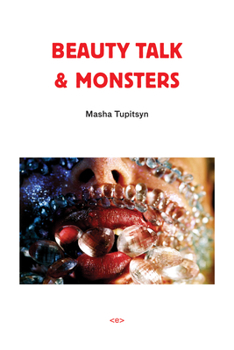Beauty Talk & Monsters
A collection of stories told through the movies that revisits the lower Manhattan art world and the Atlantic haven of Provincetown in the 1980s. Masha Tupitsyn's Beauty Talk & Monsters is a debut collection of stories told through the movies. Equally influenced by Brian De Palma and Kathy Acker, Tupitsyn revisits the ruins of a childhood and youth nurtured on the fringe of the glittering lower Manhattan art world and the Atlantic...
Format:Paperback
Language:English
ISBN:158435044X
ISBN13:9781584350446
Release Date:May 2007
Publisher:Semiotext(e)
Length:240 Pages
Weight:0.85 lbs.
Dimensions:0.7" x 6.1" x 8.9"
Age Range:18 years and up
Grade Range:Postsecondary and higher
Customer Reviews
3 ratings
insights into gender and film
Published by Thriftbooks.com User , 16 years ago
Tonight, in a basement of Chinatown, Los Angeles, I heard the author read excerpts from her book, and take questions from 2 interviewers. The passages she quoted give an amalgam of film analysis and feminist critique. The latter being of women's roles in mainstream Hollywood films. One of which was the best selling Jaws. The narrative also offers opinions about power and gender in Hollywood and movie roles. One insight is that while the idea of a male loner is not uncommon, truly rare is that of a female loner. Unless, perhaps in such roles as a witch. But typically here, while she might be a loner and powerful, she is often old and ugly. So that she is, in some sense, no longer a full woman. The insight is effective if the reader pauses, to ponder. What female loners have you seen in movies? Where these women had major parts. Aside perhaps from Ripley in the Aliens series, it is hard to recall others.
JAWS
Published by Thriftbooks.com User , 16 years ago
This book has teeth (shark teeth and word teeth) it works at you and doesn't let go. It's refreshing and provocative and it might make you a little uncomfortable, but that's ultimately what is so enjoyable about this book, the fact that it makes you move in your seat as you read. Beauty Talk and Monsters delivers on so many levels. It's about heartache and loss, discovery, adventure, and feminism (at a time when feminism could use a hand). The book is relentless in its confrontation of what we have come to accept as standards of beauty, standards that Hollywood has branded and projected onto the screen and into our lives. It's about the struggle (a woman's struggle mostly) to both love movies and hate the Hollywood dictatorship, it's about beauty and death and immortality. The writing is beautiful, dynamic and intimate, like you are in on a secret. It will remind you of a time when movies and books weren't defined by box office sales and bestseller lists and when questioning everything was what filmmakers and writers did best.
Absorbed in Red
Published by Thriftbooks.com User , 16 years ago
Marilyn Minter's garish and voluble cover photo, and the redoubtable design work of Hedi El Kholti, made me predisposed to like this book as soon as I flipped its pages. But that's just the beginning of the story. I have never met Masha Tupitsyn, the young author of BEAUTY TALK AND MONSTERS, but somehow I feel like we're on the same wavelength, and her writing exudes a magnetic force that pulls in a reader, renders him helpless and sprawling on his back like one of the butterflies of her beloved Nabokov. From Tupitsyn we learn how the movies of the seventies, from MEAN STREETS and THE EXORCIST through JAWS and SUSPIRIA, shaped her consciousness, made her eternally receptive to a host of foreign influences, while eighties films, like TOP GUN, PRETTY IN PINK and DIRTY DANCING, gave her agency and allowed her to become her own sexual object. In places this book, a collection of essays, memoirs and stories, will remind you of an animated version of Nan Goldin's BALLAD OS SEXUAL DEPENDENCY, only it's not as druggy perhaps, for who needs heavy drugs when your mind jumps and quivers as Hitchcock's camera speeds down the sordid London alleys of 1972's FRENZY and melts with a reluctant empathy as poor Brenda Blaney, FRENZY's middle-aged matchmaker, meets her fate in a man she hardly knows? Though her stories are short on dialogue, and relying on a lot of "telling," her men and women are vivid creations, with minds of their own; you walk away from BEAUTY TALK feeling that Masha Tupitsyn has seen far too much of life and remembered everything worth relating in fiction. She flits from city to city in search of--well, she admits she doesn't exactly know why. One story, "Proverbial," references the iconic 1930s lost-girl novel GOOD MORNING, MIDNIGHT by Jean Rhys, a lovely tribute to one in whose footsteps she has been doomed to walk, a restless soul seeking meaning in a globalized world. Only the movies, and the touch of men, help her heroines situate themselves in an emptiness of loss and broken commitment. And, like Kathy Acker, Tupitsyn is obsessed with violent death as a sourcebook for social change. She is a poet of the short story, with a poet's resources, an eye, an ear, a sense of rhythm both internal and external. Her tales have the brevity of Isak Dinesen's, but seem somehow strategically cut off from the sense of the centuries with which we experience Dinesen's Gothic world. Instead life, and love insofar as her heroines access it, is as Pat Benatar insisted, a battleground. I wonder where the money comes from sometimes--in Rhys you always worried with her narrators, though in Acker grand gestures replaced the anxieties of the pocketbook. In BEAUTY TALK AND MONSTERS money's not an issue much, it's like, meh, who cares. The most brilliant story in the book, "Kleptomania," comes early on, so that succeeding stories, no matter how exciting or moving, have trouble living up to its fireworks, but that's OK. Any author would have given fiv





